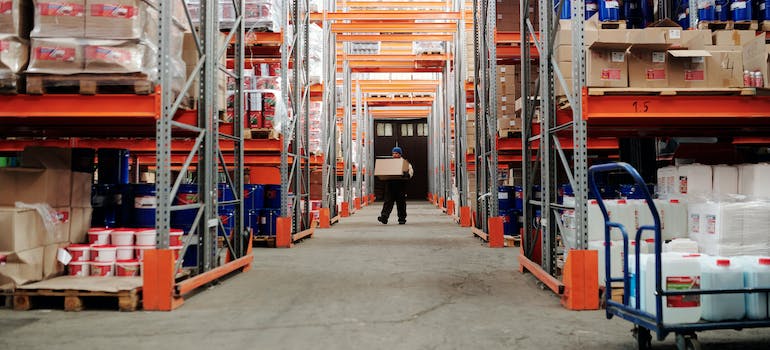Tax Deductions Related to Commercial Storage: What You Need to Know
As a business owner, you’re likely well-acquainted with the challenges of managing space and inventory. Commercial storage offers a practical solution, but did you know it also presents opportunities for tax savings? Understanding these opportunities is not just beneficial. It’s essential for maximizing your business’s fiscal efficiency. Therefore, among the myriad of expenses that businesses incur, commercial storage stands out for its utility and potential tax advantages. This Peasley Moving & Storage article sheds light on a topic that, while often overlooked, can significantly impact your business’s financial health: tax deductions related to commercial storage in the US.
Understanding Commercial Storage
Commercial storage, a seemingly straightforward concept, plays a vital role in the operational framework of many businesses. At its core, commercial storage involves the use of dedicated space to securely house business-related items. This can range from inventory and equipment to documents and surplus supplies. But what makes commercial storage an indispensable asset for businesses? It isn’t just its functionality. It’s the flexibility and efficiency it offers in managing resources and space.
Hence, looking into the types of commercial storage, we find a diverse spectrum. On one end, there are self-storage units, popular for their affordability and ease of access. These units are ideal for businesses that need additional space for inventory or equipment but don’t require frequent access. Then, there are temperature or climate-controlled storage facilities catering to businesses with sensitive items like electronics or pharmaceuticals, where maintaining a consistent environment is crucial.
Warehouse storage presents another category, often utilized by businesses with large-scale storage needs. These facilities not only offer ample space but may also provide additional services such as inventory management and logistics support.

Specialized storage solutions also exist, tailored to specific industry needs. For instance, art galleries might use storage spaces designed to preserve delicate artworks, while law firms might use secure storage for confidential documents. Understanding these different types of commercial storage is key to identifying the most suitable option for your business needs. The choice hinges on several factors:
- the nature of the items to be stored,
- the frequency of access needed, and
- the level of services required.
A small retail business in Idaho might find a self-storage Boise unit sufficient, while a manufacturing company may lean towards warehouse solutions. So, in essence, commercial storage isn’t just about finding a place to keep extra stuff. It’s about strategically utilizing space to enhance operational efficiency, safeguard assets, and, as we’ll explore, potentially unlock tax benefits.
General Principles of Business Tax Deductions
Understanding the core principles of tax deductions is crucial for any business, particularly when it comes to categorizing expenses like storage rental. The Internal Revenue Service (IRS) sets forth clear criteria for what constitutes a deductible business expense, emphasizing that it must be both “ordinary” and “necessary.”
- An “ordinary” expense is one that is common and accepted in your particular trade or business. In the context of an Idaho-based business, for instance, renting a storage unit to accommodate seasonal inventory surges or store equipment could be considered an ordinary expense. This is especially true in industries where space constraints are a regular challenge or where inventory needs fluctuate with seasons.
- The “necessary” criterion complements this by ensuring that the expense is appropriate and helpful for your business. An inventory storage rental in Idaho, for instance, may be deemed necessary if it aids in the efficient operation of the business. If it provides a secure space for inventory, it enables better inventory management and operational workflow.
These two criteria – ordinary and necessary – are pivotal in determining the deductibility of business expenses. They are broad enough to cover various business activities and expenses yet specific enough to provide a framework for evaluating their legitimacy. Keep in mind that these principles are the benchmark against which the IRS assesses the validity of such expenses. It’s not just about incurring costs; it’s about strategically incurring costs that align with the nature of your business and contribute to its effective operation.

Eligibility of Units for Tax Deductions Related to Commercial Storage
Determining the tax-deductible status of storage unit expenses rests on a fine understanding of business-related costs. While broadly categorized as rent, the deductibility of storage units necessitates a deeper examination of their usage in the context of business operations. To establish a storage unit as a deductible expense, the primary factor to consider is its exclusive use for business purposes. This means the unit must serve a clear business function, such as storing inventory, equipment, or important business records.
Furthermore, the storage unit must be rented for legitimate business needs, aligning with the industry standards and practices. For instance, if a business needs to store extra inventory due to seasonal demands or to hold equipment that is too large for the main business premises, renting a storage unit becomes a necessary and justifiable business expense.
Another key aspect is the lease or rental agreement. The terms of the agreement should reflect standard market rates and conditions. Overpaying for a storage unit or engaging in non-arms-length transactions (agreements made under preferential terms not available to the general public) could raise red flags with tax authorities. Ensuring that the rental agreement is at arm’s length, commercially reasonable, and properly documented is crucial.
Finally, location can also play a role in the deductibility of storage unit expenses. A storage unit far from the business premises might not be necessary unless there’s a specific business rationale for the choice of location. Such as proximity to a major client or supplier.
Although nothing can substitute a tax professional’s advice, these tips can help you, as a business owner, ensure that your use of Idaho storage solutions stands up to scrutiny from tax authorities. Therefore, you can maximize your potential tax benefits while maintaining compliance with tax regulations.

Specific Cases Where Storage Costs Are Deductible
Identifying scenarios where tax deductions related to commercial storage are applicable can greatly enhance a business’s tax strategy. While the overarching rule is that these expenses must be ordinary and necessary, certain specific situations highlight the deductibility of storage costs:
- Storing Business Inventory or Samples: For businesses, particularly in retail or wholesale, that experience seasonal inventory fluctuations or need to store product samples, renting storage space is typically a deductible expense. The storage unit serves as an essential extension of the business premises for inventory management.
- Document and Record Storage: Businesses required to retain significant records due to legal or regulatory mandates can deduct the cost of renting storage space for these documents. This is especially pertinent in industries subject to stringent record-keeping requirements.
- Equipment and Tool Storage: Industries such as construction or landscaping, which use heavy or specialized equipment, may find off-site storage for these tools a necessary expense, particularly if the equipment is used seasonally or infrequently.
- Temporary Storage During Business Transitions: Costs for storing furniture, equipment, or inventory during business renovations or relocations are often deductible. This scenario shows the necessity for maintaining operational continuity.
- Agricultural Storage: In the agricultural sector, storage facilities for crops, equipment, livestock feed, or other farming essentials are typically viewed as necessary expenses. Whether it’s silos for crop storage, structures for equipment during off-seasons, or facilities for feed, agricultural storage space is integral to the operation and sustainability of a farming business.
In each of these cases, the key is to establish a clear link between the storage expense and the business operations. Documenting why the storage space is rented and how it supports the business can justify the expense as a necessary part of business operations, making it a likely candidate for tax deduction.
Documentation and Record-Keeping for Storage Expenses
Effective documentation and record-keeping are essential for substantiating expenses as tax deductions related to commercial storage. Meticulous records facilitate the tax filing process and provide necessary support in case of audits. Here are key practices for documenting storage-related expenses:
- Rental Agreements or Leases: Retain all rental agreements or leases for storage units. These documents should detail the terms of the rental, including the duration, cost, and specific use of the storage space. Ensure that these agreements clearly delineate that you use the space for business purposes.
- Payment Records: Keep a thorough record of all payments made for storage units. This includes bank statements, receipts, credit card statements, or canceled checks. Consistent payment records help establish the regularity and legitimacy of the expense.
- Inventory Logs: For storage units holding inventory or business assets, maintain detailed inventory logs. These logs should track what you store, when you add or remove the items, and the purpose of the items in storage in relation to your business operations.
- Usage Documentation: Document how you use the storage unit in the context of your business. For example, if you use the storage unit for holding excess inventory, keep records that show inventory levels in relation to seasonal business cycles.
- Expense Categorization: In your financial records, categorize storage expenses accurately. This helps in distinguishing these expenses from other business costs and streamlines the process during tax preparation.
- Regular Review and Update: Regularly review and update your documentation. This includes checking that inventory logs are current and ensuring that rental agreements are up to date.
Adhering to these documentation practices not only reinforces the legitimacy of your storage expenses as tax deductions but also instills a disciplined approach to business expense management. Proper record-keeping is a critical aspect of demonstrating compliance with tax laws and maximizing your eligible deductions.

Exceptions and Limitations on Deducting Storage Expenses
While storage expenses can often be deducted, it’s important to understand the exceptions and limitations that apply. Knowing these can help you navigate the complexities of tax laws and avoid potential pitfalls:
- Personal Use: One of the primary limitations is the use of the business storage space for personal items. If a storage unit is used for both personal and business purposes, only the portion of the expense attributable to business use can be deducted. Clear separation and documentation of space usage are crucial in such cases.
- Capital Expenditures: Expenses related to the purchase, improvement, or full renovation of a storage facility are classified as capital expenditures. They are not immediately deductible as regular business expenses. Instead, these costs are usually capitalized and depreciated over the life of the asset.
- Indirect Expenses: Direct costs of renting a storage unit are typically deductible. However, indirect expenses related to the storage may not always qualify. For example, transportation costs to and from the storage facility.
- Local and State Tax Laws: In addition to federal tax guidelines, local and state tax laws may impose their own rules on the deductibility of storage expenses. Be aware of any specific regulations that apply in your business’s location, as they may differ from federal guidelines.
- Excessive or Unusual Expenses: Storage costs that are unusually high or not in line with industry standards may be under scrutiny by tax authorities. Expenses must be reasonable and customary for the type of business and the specific use of the storage.
Understanding these exceptions and limitations is key to accurately assessing the deductibility of your storage expenses. It is advisable to consult with a tax professional to ensure compliance with all applicable tax laws and regulations and to optimize your tax deductions within the legal framework.
The Strategic Value of Understanding Commercial Storage Tax Deductions
Grasping the nuances of tax deductions related to commercial storage is crucial for any savvy business owner. It’s beyond a fiscal formality. It’s a strategic tool that can enhance your business’s financial efficiency. Also, you will position your business to capitalize on these deductions by understanding the eligibility criteria, keeping precise records, and being aware of the limitations. Besides, this knowledge isn’t exclusively about cost-saving. It’s an integral part of smart financial management, enabling you to turn a necessary expense into a beneficial tax strategy.

Everyone from the packers to the movers were awesome! They were all very professional and showed up when they were supposed to. would definitely use them again.

